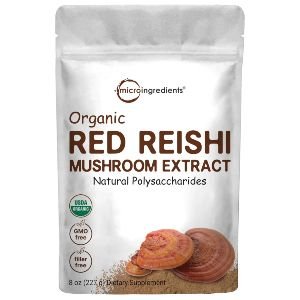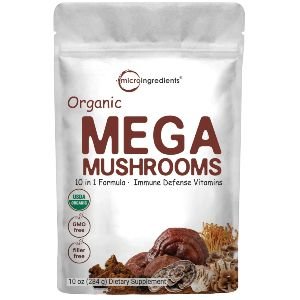Reishi Mushroom vs Lion’s Mane: A Comprehensive Comparison Guide
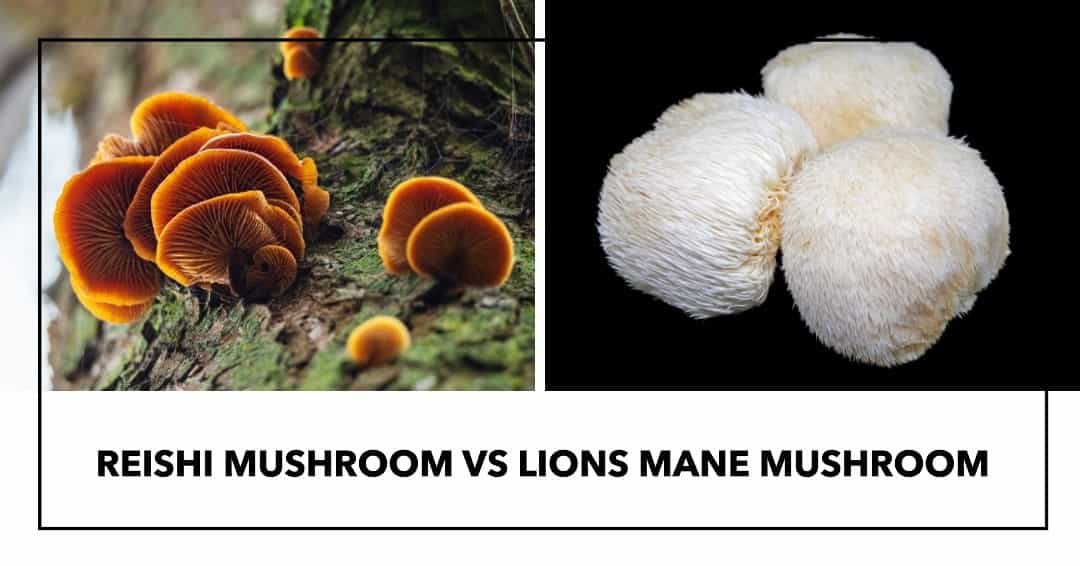
Mushrooms have been known for their numerous health benefits for centuries. In this reishi mushroom vs lion’s mane article, I’ll compare two of the most popular medicinal mushrooms: Reishi and Lion’s Mane.
More specifically, I will be comparing their nutritional values, health benefits, side effects, preparation and consumption methods, and availability and cost.
This way it will help you decide which mushroom is best for you. So, without further delay’s let’s “jump” straight in.
Reishi Mushroom vs Lion’s Mane
Reishi Mushroom
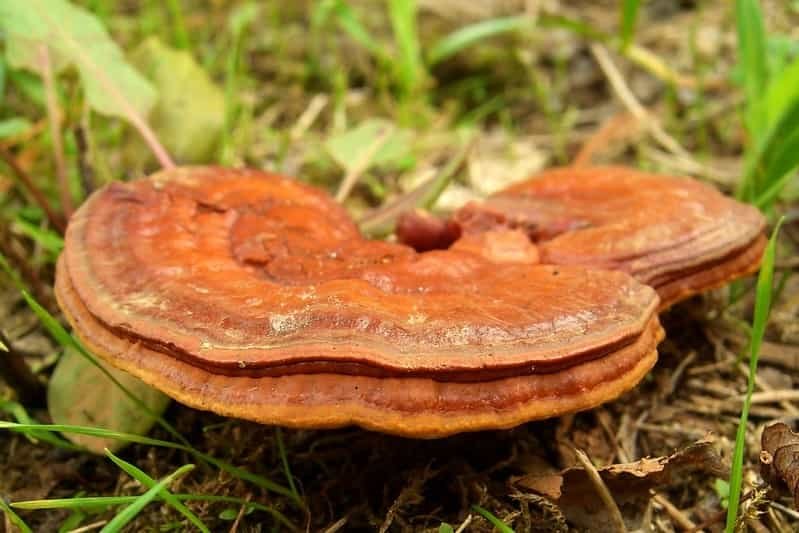
Reishi Mushroom, also known as Ganoderma lucidum, is a type of mushroom that grows on the wood of deciduous trees.
It has a long history of use in traditional Chinese medicine, and is believed to have immune-boosting and anti-inflammatory effects.
Lion’s Mane Mushroom
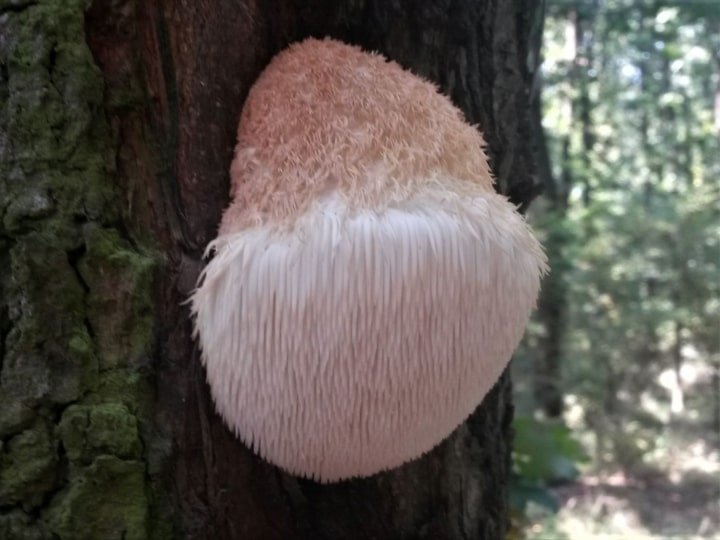
Lion’s Mane Mushroom, also known as Hericium erinaceus, is a mushroom that grows on the trunks of hardwood trees.
It has been used in traditional Chinese medicine for its potential to support cognitive function and improve digestion.
Here’s a quick Reishi Mushroom vs Lion’s Mane mushroom comparison table that provides a quick overview of the differences between the two mushrooms.
| Characteristics | Reishi Mushroom | Lion’s Mane Mushroom |
|---|---|---|
 | 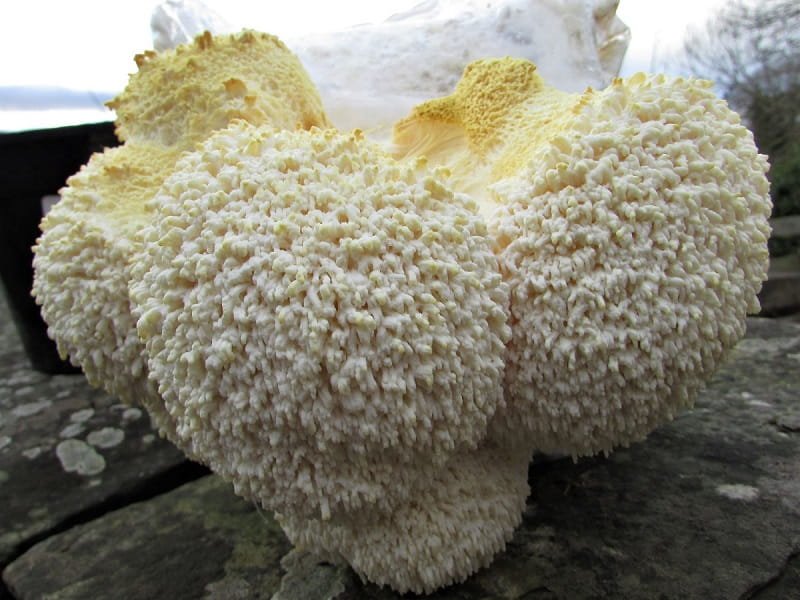 | |
| Other Names | Ganoderma lucidum Lingzhi | Hericium erinaceus Yamabushitake |
| Texture | Tough and woody | Soft and fluffy |
| Origin | Asia | North America, Europe, and Asia |
| Appearance | Reddish-brown with a shiny top | White with long spines |
| Taste | Bitter and earthy | Sweet and slightly seafood-like |
| Traditional uses | Immune booster, stress management, and longevity | Cognitive health, mental agility, and nerve regeneration |
Nutritional Value
When it comes to their nutritional value, both Reishi Mushroom and Lion’s Mane are low in calories and fat, and are a good source of fiber, protein, and certain micronutrients. However, they differ in their specific nutrient profiles.
Here’s a comparison of the nutritional value of Reishi Mushroom and Lion’s Mane:
| Nutrient | Reishi Mushroom (100g) | Lion’s Mane Mushroom (100g) |
|---|---|---|
| Calories | 25 kcal | 33 kcal |
| Protein | 2.5 g | 3.3 g |
| Carbohydrates | 5.5 g | 6.3 g |
| Dietary Fiber | 2.0 g | 1.8 g |
| Fat | 0.6 g | 0.5 g |
| Vitamin D (IU) | 7 IU | 20 IU |
| Vitamin B1 (Thiamin) | 0.13 mg | 0.10 mg |
| Vitamin B2 (Riboflavin) | 0.16 mg | 0.15 mg |
| Vitamin B3 (Niacin) | 1.5 mg | 1.8 mg |
| Vitamin B5 (Pantothenic Acid) | 0.32 mg | 0.35 mg |
| Vitamin B6 (Pyridoxine) | 0.10 mg | 0.12 mg |
| Vitamin B9 (Folate) | 10 µg | 12 µg |
| Calcium | 6 mg | 8 mg |
| Iron | 1.2 mg | 1.0 mg |
| Magnesium | 20 mg | 18 mg |
| Phosphorus | 60 mg | 65 mg |
| Potassium | 300 mg | 320 mg |
| Sodium | 6 mg | 5 mg |
| Zinc | 1.4 mg | 1.2 mg |
Keep in mind that these values are estimates, gathered from around the web and formated in an easy to read table. It is nearly impossible to establish a standardize nutrition value label for fungus since everything in their surrounding and the way they are grown, affect their nutrients.

Health Benefits
Both Reishi Mushroom and Lion’s Mane Mushroom are believed to have a wide range of health benefits, thanks to their unique blend of active compounds.
Here are some of the potential health benefits associated with each mushroom (number in brackets are links to scientific evidence about these claims):
Reishi Mushroom:
- May boost immune function: Reishi Mushroom contains compounds called beta-glucans, which are believed to stimulate the immune system and increase the production of white blood cells. [1] [2]
- May reduce inflammation: Reishi Mushroom contains triterpenes, which have been shown to have anti-inflammatory effects. [1] [2] [3]
- May support liver health: Reishi Mushroom has been shown to have hepatoprotective effects, meaning it may help protect the liver from damage. [1] [2]
- May improve sleep quality: Reishi Mushroom has been shown to have sedative effects, and may help improve sleep quality in individuals with insomnia. [1]
Lion’s Mane Mushroom:
- May support cognitive function: Lion’s Mane Mushroom contains compounds called erinacines and hericenones, which have been shown to stimulate the growth of nerve cells and improve cognitive function. [1] [2] [3]
- May improve mood: Lion’s Mane Mushroom has been shown to have antidepressant effects, and may help improve mood in individuals with depression. [1] [2]
- May support digestion: Lion’s Mane Mushroom has been shown to have prebiotic effects, meaning it may help promote the growth of beneficial gut bacteria and support digestive health. [1]
- May reduce inflammation: Lion’s Mane Mushroom contains compounds called polysaccharides, which have been shown to have anti-inflammatory effects. [1] [2]
It’s worth noting that while these mushrooms have been extensively studied for their potential health benefits, more research is needed to fully understand their effects on human health.
Potential Side Effects
Both Reishi Mushroom and Lion’s Mane Mushroom are generally considered safe for consumption, and have few reported side effects. However, some individuals may experience mild digestive upset or allergic reactions to these mushrooms.
Here is a table outlining the potential side effects of Reishi Mushroom and Lion’s Mane Mushroom:
| Mushroom | Potential Side Effects |
|---|---|
| Reishi Mushroom | – Mild digestive upset – Allergic reactions in some individuals – May interact with certain medications – Safety during pregnancy and breastfeeding not established |
| Lion’s Mane Mushroom | – Mild digestive upset – Allergic reactions in some individuals – May interact with certain medications – Safety during pregnancy and breastfeeding not established |
It’s important to note that while these mushrooms are generally considered safe for consumption and have few reported side effects, individuals may experience different reactions depending on their individual health status and medication use.
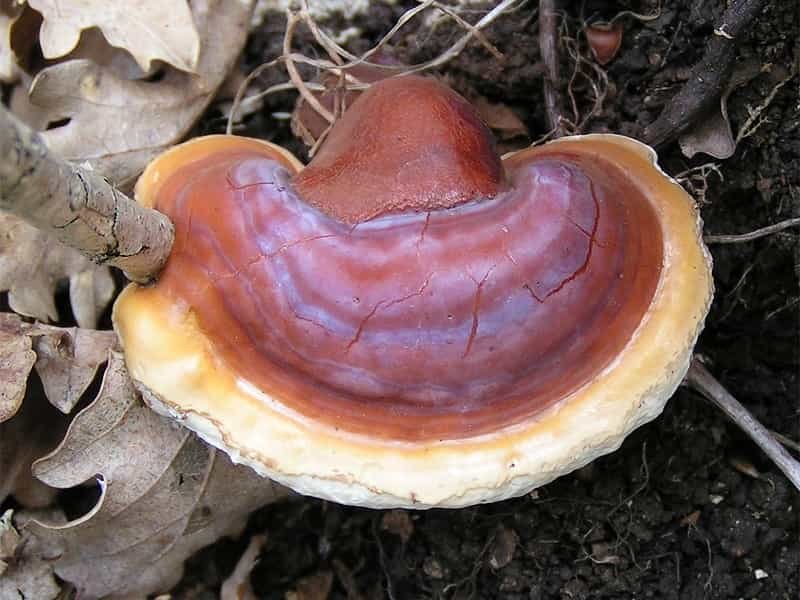
Preparation and Consumption
Capsules, powders, teas, and tinctures are all ways to take Reishi Mushroom and Lion’s Mane Mushroom. When it comes to preparation, the procedure varies based on the type of mushroom utilized.
Reishi
For Reishi Mushroom, the most common preparation methods include:
- simmering the mushroom in water to create a tea, or
- taking it in capsule or powder form.
Reishi Mushroom tea can be brewed by simmering sliced or chopped mushrooms in water for several hours, then straining the liquid and discarding the solids.
Reishi Mushroom powder can be added to smoothies or other beverages, or used in cooking and baking.
Lion’s Mane
For Lion’s Mane Mushroom, the most common preparation methods include
- sautéing the mushroom in butter or oil, or
- taking it in capsule or powder form.
The Lion’s Mane Sautéed mushrooms in butter or oil can be used as a tasty complement to a number of recipes or consumed as a snack on their own.
Lion’s Mane Mushroom powder can also be added to smoothies or other beverages, or used in cooking and baking.
It’s crucial to remember that the strength of these mushrooms varies depending on the manner of preparation and the grade of the fungus utilized. So, in order to avoid any potential gastric discomfort, start with small amounts and gradually increase the dosage.
Availability and Cost
Both Reishi Mushroom and Lion’s Mane Mushroom are readily accessible in a number of forms, such as capsules, powders, and teas.
Nevertheless, the price varies based on the type and grade of mushroom.
In general, Reishi Mushroom tends to be more expensive than Lion’s Mane Mushroom due to its scarcity and the difficulty of cultivating it.
Nevertheless, the availability and pricing of these mushrooms might vary depending on where you live and where you buy them.
Bottom Line
Reishi Mushroom and Lion’s Mane Mushroom are both powerful medicinal mushrooms with a wide range of potential health benefits.
While they share some similarities in their nutrient profiles and potential uses, they also have key differences in their active compounds and potential effects on the body.
Ultimately, the best mushroom for you will depend on your individual health needs and preferences.
You Might Be Interest in:

